Reply To:
Name - Reply Comment
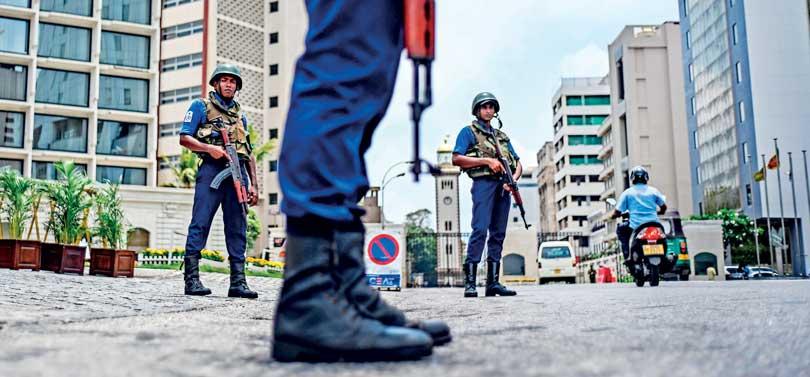
laws could also have been swiftly amended to deal with any gaps
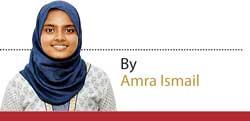 In the wake of the Easter Sunday terrorist attacks, a question has emerged regarding the inadequacy of the existing laws to combat terrorism, and whether new laws should be brought in to counter international terrorism. Prime Minister Ranil Wickremesinghe told Skynews that there were no laws in Sri Lanka to arrest those who joined foreign terrorist groups and returned to the country.
In the wake of the Easter Sunday terrorist attacks, a question has emerged regarding the inadequacy of the existing laws to combat terrorism, and whether new laws should be brought in to counter international terrorism. Prime Minister Ranil Wickremesinghe told Skynews that there were no laws in Sri Lanka to arrest those who joined foreign terrorist groups and returned to the country.
Laws to arrest IS members
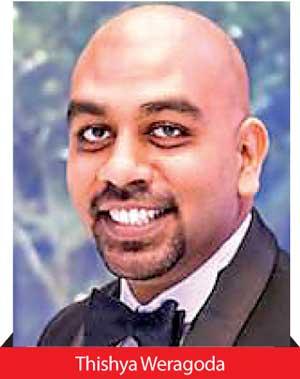 Speaking to the Daily Mirror, Attorney-at-Law Thishya Weragoda said that those who joined foreign terrorist organisations could have been arrested under the Prevention of Terrorism Act. “The PTA clearly says whether it is done within Sri Lanka or outside Sri Lanka, if it is an unlawful act within the meaning of the PTA, it falls in. Unlawful acts are what falls within Section 2 of the PTA. So if a Sri Lankan commits terrorist activities in another country we can’t say we don’t have any laws. It is covered,” said Weragoda.
Speaking to the Daily Mirror, Attorney-at-Law Thishya Weragoda said that those who joined foreign terrorist organisations could have been arrested under the Prevention of Terrorism Act. “The PTA clearly says whether it is done within Sri Lanka or outside Sri Lanka, if it is an unlawful act within the meaning of the PTA, it falls in. Unlawful acts are what falls within Section 2 of the PTA. So if a Sri Lankan commits terrorist activities in another country we can’t say we don’t have any laws. It is covered,” said Weragoda.
Legal Expert Dr.Asanga Welikala said that the International Covenant on Civil and Political Rights Act 2007, Suppression of Terrorist Bombings Act 1999 and the UN sanctions against IS could have also been used.
“The International Covenant on Civil and Political Rights Act 2007 makes it a criminal offence to incite religious hatred and to propagate war. This Act also makes it a criminal offence to attempt, aid, abet, or threaten to commit acts of inciting religious hatred or propagate war. There is the Suppression of Terrorist Bombings Act 1999 which again covers attempts to commit, or aid and abet terrorist bombings. There are also various provisions in the Penal Code in relation to murder, hurt, use of criminal force, and criminal conspiracy, as well as attempts to commit any of these offences, that could have been used,” Dr. Welikala told the Daily Mirror.
According to Section 2 of the Penal Code the offense can be committed within or outside Sri Lanka and will fall under the Penal Code. Further, according to Section 9 (1) (f) of the Judicature Act, the High Court has jurisdiction to hear cases on offenses committed by a Sri Lankan outside its (Sri Lanka’s ) territory.
Dr.Welikala also added that there are UN sanctions against IS which have been given effect to by domestic statutory instruments under the United Nations Act, 1968. “These are regulations that give effect to Sri Lanka’s international obligations with regard to the UN anti-terrorism sanctions regime. They were first made in 2012 and subsequently amended in 2016 to specifically include Islamic State (or Islamic State of Iraq and Levant, or Da’esh). The regulations set out the domestic machinery through which UN sanctions against these terror groups can be upheld,” he said.
The PTA clearly says whether it is done within Sri Lanka or outside Sri Lanka, if it is an unlawful act within the meaning of the PTA, it falls in
Banning extremist groups
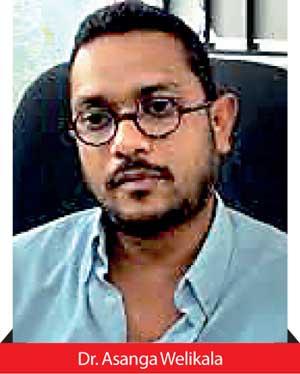 Initially, President Maithripala Sirisena said that there were no laws to ban the National Thowheed Jamath. However, subsequently he banned both the National Thawheed Jammath (NTJ) and Jamathei Millathu Ibraheem (JMI) under Emergency Regulations No. 01 of 2019. The President’s Media Division further announced that activities of other extremist groups would be banned as well under the Emergency Regulations.
Initially, President Maithripala Sirisena said that there were no laws to ban the National Thowheed Jamath. However, subsequently he banned both the National Thawheed Jammath (NTJ) and Jamathei Millathu Ibraheem (JMI) under Emergency Regulations No. 01 of 2019. The President’s Media Division further announced that activities of other extremist groups would be banned as well under the Emergency Regulations.
Dr. Welikala said that Section 27 of the PTA could be used to proscribe the NTJ or any other such organisation. “This provision gives the Minister the power to make regulations for the purpose of carrying out or giving effect to the principles and provisions of the PTA. When convenient, such regulations must be brought before Parliament for approval, and they are deemed rescinded if parliamentary approval has not been given,” he said.
“The Liberation Tigers of Tamil Eelam (LTTE) was first proscribed in the wake of the bombing of the Temple of the Tooth in 1998 by emergency regulations. In 2001, when the Government lost its majority in Parliament and the state of emergency lapsed, so did the ban on the LTTE. The President then used Section 27 of the PTA to reintroduce the proscription. Even after the state of emergency was terminated after the war in 2011, PTA regulations were made to continue the proscription of the LTTE and the Tamil Rehabilitation Organisation (TRO), which are still in force. So even without a state of emergency, the PTA provides a wide proscribing power to the Government in relation to organisations associated with terrorism,” he added.
There is the Suppression of Terrorist Bombings Act 1999 which again covers attempts to commit, or aid and abet terrorist bombings
Are the laws sufficient?
When the Daily Mirror queried whether the PTA is sufficient to counter internationalised terrorism, Weragoda responded by saying, “Something is better than nothing. They could have used some obscure provision in the law to stop these people, if they really wanted to,” he said.
“Leave the law aside. Say that you know somebody who has engaged in terrorist activity is coming to Sri Lanka. You can still hold him for 24 hours and question him. Has any of these people been questioned at least for 24 hours? That’s the question everyone should ask from the Prime Minister. None of that has been done. They’re just trying to come up with excuses,” he said.
He also said that akin to how the offenses against the Aircraft Act was brought in and applied retrospectively to penalise Sepala Ekanayake for hijacking an aircraft, new legislation could have been brought in. “If it is not covered you can bring in new legislation. So if it was known that there were people who had joined foreign terrorists organisations what were they doing?” he asked.

An AFP released picture of the ISIS members who were believed to have carried out the bombings in sri lanka
According to Dr. Welikala existing laws are sufficient to detain, investigate and convict, and even to proscribe, the individuals and groups currently being identified with the Easter Sunday attacks. “Had the evidence that had been emerging regarding these activities been taken seriously and acted upon, then we could have made meaningful progress in preventing the attacks. If it had proved necessary, laws could also have been swiftly amended to deal with any gaps,” he said.
However, he pointed out that Sri Lankan laws needed to be updated to take account of the new globalised context of terrorism. “One of the purposes of the Counter Terrorism Bill currently being considered by a parliamentary oversight committee was to modernise our anti-terrorism powers framework in the context of global terrorism. It is important to stress that several critical defects in the Bill need to be corrected so that there are effective and adequate safeguards against the abuse of anti-terrorism powers. However, the Government has been both opaque in the process of drafting and dilatory in enacting this legislation,” he said.
Emergency Regulations No. 01 of 2019
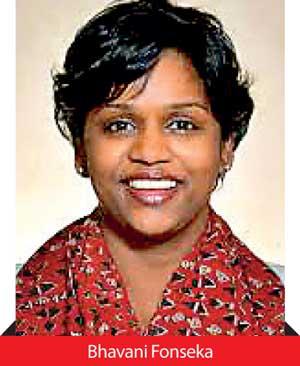 President Maithripala Sirisena declared a State of Emergency on April 23. Emergency Regulations were issued on April 24. The Emergency Regulations relate to taking into possession premises and requisitioning of vehicles and of personal services, control of meetings, processions, publications, firearms and right of entry, supervision, search, arrest and detention.
President Maithripala Sirisena declared a State of Emergency on April 23. Emergency Regulations were issued on April 24. The Emergency Regulations relate to taking into possession premises and requisitioning of vehicles and of personal services, control of meetings, processions, publications, firearms and right of entry, supervision, search, arrest and detention.
Dr. Welikala said that the emergency regulations are overbroad and prone to abuse, and potentially transgress the outer limits of the restrictions on fundamental rights permitted by the country’s Constitution. “In combatting the clear and present danger of international terrorism, the importance of striking the proper balance between security and freedom cannot be overstated. For this, all counterterrorism measures must conform to the minimum standards established by both the Constitution and international law,” he said.
In similar vein Attorney-at-Law Bhavani Fonseka said that emergency regulations should be proportionate. “Otherwise Government critics would be targeted,”
she said.
emergency regulations should be proportionate. Otherwise Government critics would be targeted